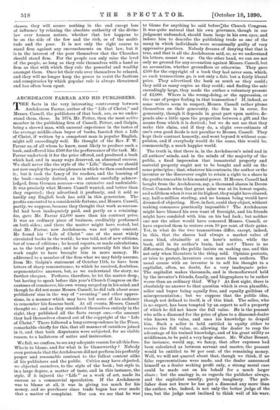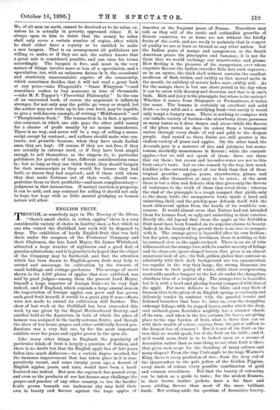ARCHDEACON FARRAR AND HIS PUBLISHERS.
THE facts in the very interesting controversy between Archdeacon Farrar, author of the "Life of Christ," and Messrs. Cassell, the publishers of that book, are, as we under- stand them, these. In 1874, Mr. Petter, then the most active member in the publishing firm of Cassell, Petter, and Galpin, being a shrewd man, with unusual experience in the tastes of the average middle-class buyer of books, fancied that a Life of Christ, if written by a competent man in popular English, might sell exceedingly well. He thought of the Rev. F. W. Farrar as, of all whom he knew, most likely to produce such a book, and offered him 2500 for the performance of the task. Mr. Farrar undertook it for the price offered, and produced a book which had, and in many ways deserved, an abnormal success. We shall never like the style of the "Life," though we should not now employ the precise phrases in which we then condemned it ; but it took the fancy of its readers, and the learning of the book—mainly derived, as its author carefully acknow- ledged, from German sources—was extensive and undeniable. It was precisely what Messrs. Cassell wanted, and better than they expected ; they advertised it profusely, and it sold as hardly any English book has sold in this generation. The profits amounted to a considerable fortune, and Messrs. Cassell, partly, we suppose, because they thought that work so success- ful had been inadequately paid, and partly as a retaining- fee, gave Mr. Farrar 22,000 more than his contract price. It was an ordinary piece of business, creditably performed on both sides ; and there the matter might have rested, but that Mr. Farrar, now Archdeacon, was not quite content. He found his "Life of Christ" one of the most widely circulated books in the world; he was told, not of new editions, but of tens of editions ; he heard reports, or made calculations, as to the total profits ; and he quite naturally felt that his work ought to have brought him in more money. He addressed to a member of the firm what we may fairly assume, from Mr. Galpin's statement of October 11th, to have been letters of sharp remonstrance, to which he received, doubtless, argumentative answers, but, as we understand the story, no further cheques. Perforce, therefore, he let the matter drop ; but having to speak before this year's Church Congress on the customs of commerce, his own wrong surged up in his mind, and though he did not name Messrs. Cassell, he did talk about some publishers' sins in the way of " sweating " and other oppres- sions, in a manner which may have led some of his audience to remember his famous book. At all events, Messrs. Cassell thought so ; and as they considered themselves entirely in the right, they published all the facts except one,—the amount they had themselves cleared out of the copyright of the "Life of Christ." There followed a long correspondence in the Times, remarkable chiefly for this, that all manner of outsiders joined in it, and that both disputants were subjected, for no visible reason, to a hailstorm of satire and insinuation.
We fail, we confess, to see any adequate reason for all this fuss. Who is to blame, and for what is he blameworthy ? Nobody even pretends that the Archdeacon did not perform his perfectly proper and reasonable contract to the fullest content alike of his publishers and the public. Critics may have objected, we objected ourselves, to the style of the book ; but style is, in a large degree, a matter of taste, and in this instance, the style, if it injured the "Life" as a work of art, made its success as a commercial speculation. If the Archdeacon was to blame at all, it was in giving too much for his money, and no purchaser since trade began has ever made that a matter of complaint. Nor can we see that he was to blame for anything he said before:the Church Congress. It was quite natural that his own grievance, though in our judgment unfounded, should loom large in his own eyes, and induce him to describe the publishing trade as one of the many in which individuals were occasionally guilty of very oppressive practices. Nobody dreams of denying that that is true, and that is all the Archdeacon said, or, as we understand his letters, meant to say. On the other hand, we can see not only no ground for any accusation against Messrs. Cassell, but no accusation, whether groundless or otherwise. They gave £500 for the copyright of a book they had never seen, which, as such transactions go, is not only a fair, but a fairly liberal price. They advertised the book as much as they could ; they sold as many copies as they could; and finding the sale exceedingly large, they made the author a voluntary present of £2,000. Where is the wrong-doing, or the oppression, or the want of proper feeling in that transaction ? If, indeed, as some writers seem to suspect, Messrs. Cassell rather plume themselves on their generosity, the firm is in error, for generosity, though it depends in great part upon motive, de- pends also a little upon the proportion between a gift and the means from which it is derived ; but we do not see that they make this claim, and if they do, a slight over-estimate of one's own good deeds is not peculiar to Messrs. Cassell. They kept their contract honestly, and went beyond it without com- pulsion, and if everybody would do the same, this would be, commercially, a much happier world.
The truth is, that there is, in the Archdeacon's mind and in all authors' minds, and in the minds of the majority of the public, a fixed impression that immaterial property and material property ought not to be bought and sold on the same principles ; that, whatever his contracts, the author or the inventor or the discoverer ought to retain a right to a share in the profits traceable to his mental power. If Messrs. Cassell had bought from the Archdeacon, say, a thousand shares in Devon Great Consols when that great mine was at its lowest repute, and sold them when it was at its highest, they might have cleared, say, hall-a-million sterling, and no human being would have dreamed of objecting. How, in fact, could they object, without making commerce practically impossible ? The Archdeacon might have blamed his own want of foresight, and his friends might have condoled with him on his bad luck ; but neither one nor the other would have censured Messrs. Cassell, or have expected them to restore even 10 per cent, of their gains. Yet, in what do the two transactions differ, except, indeed, in this, that the shares had always a market value of some kind, obtainable at an hour's notice, while the book, still in its author's brain, had not ? There is no difference, though the public insists on making one, and this not only when literature is the thing sold. Opinion protects, or tries to protect, inventors even more than authors. The usual course with an inventor is to sell his thought to a capitalist, often, no doubt, for a very inadequate price The capitalist makes thousands, and is thenceforward held by the inventor's friends, family, and biographers to be rather worse than an ordinary thief. Why ? At first sight, there is absolutely no answer to that question which is even plausible, seller and buyer being equally free, and equally guiltless of misrepresentation ; but we suppose that the public idea, though not defined to itself, is of this kind. The seller, who is no expert, has been tempted by an expert to sell a property of which be did not know the full value. He is the peasant who sells a diamond for the price of glass to a diamond-dealer who knows its value, and uses his knowledge to despoil him. Such a seller is held entitled in equity either to receive the full value, or, allowing the dealer to reap the advantage of his trained knowledge, and of his great utility as middleman, to be paid a very large share. Mr. Walter Besant, for instance, would say, we fancy, that after expenses had been calculated as between servant and master, the peasant would be entitled to 80 per cent. of the remaining money. Well, we will not quarrel about that, though we think-, if no false representations were made, and the dealer announced himself as a dealer seeking profit only, a strong moral case could be made out on his behalf for a much larger share ; but the analogy is, as regards the publisher always, and the capitalist usually, purely imaginary. The pub- lisher does not know he has got a diamond any more than the author, who, indeed, is not only the better judge of the two, but the judge most inclined to think well of his ware.
He, of all men on earth, cannot be deceived as to its value, or, unless he is actually in poverty, oppressed either. It is always open to him to insist that the money he takes shall only cover a certain number of copies,. after which he shall either have a royalty or be entitled to make a new bargain. That is an arrangement all publishers are willing to make, or if they are not, the author knows that a great sale is considered possible, and can raise his terms accordingly. The bargain is free, and must in the very nature of things involve more or less of a speculation, and a speculation, too, with an unknown datum in it, the occasional and absolutely unaccountable caprice of the community, which sometimes decides that it will not read a great book at any price—take Fitzgerald's "Omar Khayyam "—and sometimes rushes to buy nonsense in tens of thousands, —take M. F. Tupper's "Proverbial Philosophy." In the case of an uncreated book, of course the argument is infinitely stronger, for not only may the public go crazy or stupid, but the author may not write up to his own level, may be capable, to give a well-known example, of writing " Middlemarch " and " Theophrastus Such." The transaction is, in fact, a specula- tive contract, in which one side pays the other solid money for a chance of profit usually by no means immoderate. There is no way, and never will be a way, of selling a manu- script except by contract ; and authors should make wise con- tracts, not grumble because, when they have made foolish ones, they are kept. Of course, if they are not free, if they are actually in extreme need, or if they have been stupid enough to sell themselves, as the singers do, to particular publishers for periods of time, different considerations come in; but so long as they can think freely, they should bargain for their manuscripts as they would for houses they had built, or shares they had acquired ; and if those with whom they deal make fortunes out of their work, should con- gratulate them on their profitable—and most complimentary— judgment in that transaction. If mental exertion is property, it can be sold, and any contract for selling it should not only be kept, but kept with as little mental grudging as human nature will allow.







































 Previous page
Previous page